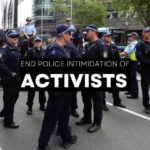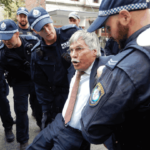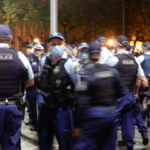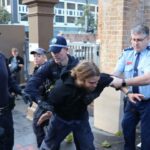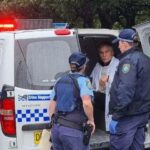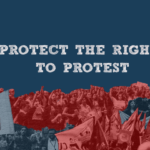City of Sydney Calls on Perrottet to Revoke Draconian Anti-Protest Laws
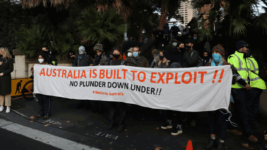
The activist community in NSW is not, as some media portrays it, a group of antisocial nihilists attempting to disrupt society for kicks, but rather its people dedicating their own time and energy to campaign for reforms predominantly related to social justice and defending climate.
Struggle with the authorities is par for the course for activists. However, the anti-protest laws dropped on NSW in early April are so draconian in their reach that a level of despondency has set in amongst some climate agitators as their chief way of taking meaningful action has been dashed.
But according to City of Sydney deputy mayor Sylvie Ellsmore, all hope is not lost, as what we’re witnessing right now is the usual pushback from government in the face of some broad gains made by the climate movement over recent years and this overreach response won’t last.
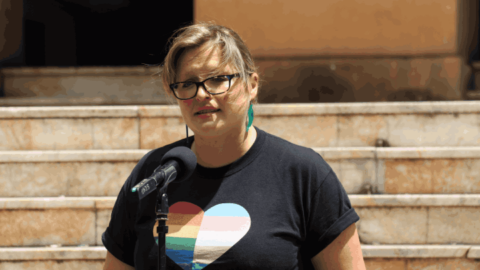
So, whilst NSW premier Dominic Perrottet might be grinning from ear to ear in regard to witnessing the spirits of climate defenders having sunk to a low ebb, whilst fossil fuel executives can see a clear path ahead, it’s likely these laws won’t last, and the roads will be blocked once more.
And Greens deputy mayor Ellsmore recently put a motion to council, which calls on the Coalition to repeal the antidemocratic protest laws and further cries foul over the heavy-handed “militarised” policing that’s been unleashed upon local climate defenders. And it was passed unanimously.
Intimidated into silence
“It is quite clear that these laws are designed to intimidate people from peacefully protesting,” said Ellsmore, adding that this is apparent due to the excessively high penalties that now apply to certain forms of protest.
Since April, an individual who blocks or disrupts a road, tunnel, bridge or a major facility without prior authorisation is liable to up to 2 years imprisonment and/or a fine of $22,000, whereas prior to this, the blocking of traffic during a protest could only see a demonstrator fined $440.
The reason climate defenders have focused upon these nonviolent direct actions that do disrupt “business as usual” in an unannounced manner is that it’s one of the most effective ways to draw broader public attention to the climate crisis, as it’s through this inconvenience that it’s captured.
Late last year and moving into this one, climate groups, such as Blockade Australia and Fireproof Australia, were increasingly taking this tactic, as government wasn’t and isn’t adequately addressing changing climate, which is despite numerous authorised mass protest actions having taken place.
“In particular, the new laws are designed to intimidate protesters at a time, when the community is screaming out that the NSW Liberal government and the federal government is to take faster action to address climate change,” the City of Sydney deputy mayor told Sydney Criminal Lawyers.
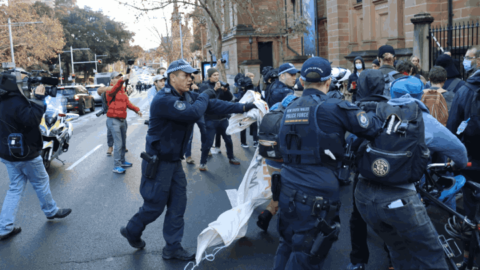
Public enemy number one
“The NSW police has formed a militarised police unit, Strike Force Guard, which has targeted environmental campaigners,” states the right to protest motion Ellsmore put to council.
Strike Force Guard was rolled out on the third day of a series of nonviolent direct actions Blockade Australia carried out at Sydney’s Port Botany in March, with the aim of intercepting activists pre-protest.
Blockade Australia had successfully disrupted Newcastle Coal Port for two weeks in November last year.
As the Sydney deputy mayor points out the police unit, which was only emboldened further by the subsequent anti-protest laws, has since been using tactics upon climate defenders that would usually be “associated with police trying to disrupt really serious organised crime or terrorism”.
These actions have included the staking out of a Colo property where activists were gathered in June, two subsequent raids upon the property, the location and arrest of activists days after protests for being on a road, as well as a raid upon a post-action activist picnic in an inner west park.
Called out by the NSW Council for Civil Liberties, the most recent overreach relating to climate defenders was a series of home visits made to prominent activists prior to the International Mining and Resources Conference, warning them against protesting it and filling them in on the new laws.
“It’s really hard not to see these actions as a deliberate tactic by the state to intimidate and discourage peaceful protest and to intimidate and discourage people talking about climate change and the need for government to do more than they’re currently doing,” Ellsmore underscored.
Looking beyond the immediate
Following the passing of the NSW anti-protest laws, similar such laws aimed at stamping out environmental action via extreme penalties were passed in Victoria and Tasmania in August. And over in the UK, the government is also legislating against climate defenders.
However, when this seeming trend was put to Ellsmore, she countered the suggestion, stating that the history of such matters reveals that the authorities crack down when successful gains are being made by grassroots movements.
So, these laws may be something of a sign that recent climate actions are impacting.
The deputy mayor further states that these “waves of governments doing this are ultimately pushed back by the courts”. And she pointed to the successful 2017 High Court challenge of 2014 Tasmanian anti-protest legislation by Bob Brown, which saw the laws overturned as they were unconstitutional.
“We have a current challenge by the Environmental Defenders Office working with the Knitting Nannas in NSW to strike these laws down,” Ellsmore added.
“These laws are fundamentally antidemocratic. You can’t arrest people for doing something that’s peaceful, nonviolent and not actually disrupting anything in many cases. It is a fundamental threat to our democracy if we don’t defend the right to peaceful protest.
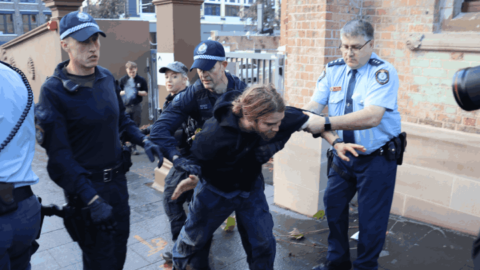
Built to fail
Further supporting the Sydney deputy mayor’s assertion that these laws are so draconian in their reach that they’ll soon fall over is the absurd manner in which they came to fruition.
NSW roads minister Natalie Ward was made late to work on 14 March this year, as Fireproof Australia blocked the Split Bridge that morning.
Later that day, the minister appeared on 2GB radio with Ben Fordham, where she expressed her outrage and agreed to pass “severe” penalties on being prompted by the shock jock.
And ten days following her radio appearance, Ward amended the law, so these draconian penalties were applied to bridges and tunnels, and a week after that, attorney general Mark Speakman jammed legislation through to extend them to roads and major facilities, with bipartisan approval.
The City of Sydney motion requires that Sydney lord mayor Clover Moore writes to the NSW attorney general, the shadow AG, the police minister and the NSW police commissioner outlining that the council wants the laws revoked and the heavy-handed policing brought to an end.
“We were asked by local human rights groups and activists who’d been arrested in the city whether we’d move something through council,” Ellsmore concluded. “It was supported unanimously by Labor and the Liberals, even though both Labor and Liberals voted for the laws in NSW parliament.”
“This is a sign of how out of touch these laws are from where the community is at and it’s just such an overreach.”


